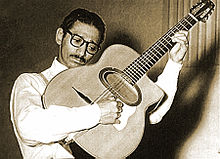Oscar Alemán
Oscar Marcelo Alemán (* 20th February 1909 in Resistencia , Chaco province , † 14. October 1980 in Buenos Aires ) was an Argentine jazz - guitarist and dancer , entertainer and singer .
Live and act
Oscar Alemán comes from the Chaco province in northern Argentina. At the age of six he already appeared in his family's folklore ensemble, the Moreria Sextet . First he played the cavaquinho , a Brazilian variant of the ukulele , before switching to the guitar. At the age of ten, after the death of his mother and his father's suicide, he was an orphan and for the next few years made his way as a dancer and musician in the streets of Santos .
Alemán played two different guitars - mostly a Selmer Macafferi (which was also used by Django Reinhardt ), but also a resonance guitar . In 1924 Alemán worked with the Brazilian guitarist Gaston Bueno Lobo. As a duo, they received a record deal with the Argentine branch of Victor Records and performed under the name Los Lobos . Occasionally the violinist Eleven Verdure also took part; Recordings were made as a Trio Victor .
In the late 1920s he performed with the dancer Harry Fleming in Spain; In the early 1930s, Alemán moved to Paris under the influence of American jazz from Eddie Lang and Joe Venuti , where Josephine Baker brought him to her band, The Baker Boys at the Cafe de Paris , as an accompanying musician in 1931 . This gave him the opportunity to perform with the famous American jazz musicians who came to see Josephine Baker and play with her band.
Alemán later founded his own nine-member ensemble with Frank “Big Boy” Goudie , which played regularly at Club Le Chantilly , directly opposite the place where Django Reinhardt and his partner, the violinist Stephane Grappelli, performed with their quintet at the Hot Club de France . Although the two guitarists never performed together, Reinhardt and Alemán became close friends. During his time in Paris he played in the ensemble Freddy Taylor's Swing Men from Harlem from 1933 to 1935 . Recordings were made in the mid-1930s with Freddy Taylor; also with Bill Coleman , 1938 with Eddie Brunner and 1939 with Danny Polo , also with Svend Asmussen , and Alix Combelle . In 1938/39 he recorded eight pieces under his own name.
In 1939, the jazz critic and producer Leonard Feather became aware of Alemán while visiting Paris; on his return to the United States he stated: "Alemán has more swing than any other guitarist on the continent". In the early 1940s Alemán returned to Buenos Aires and performed with a swing quintet, with which he also recorded, and with a nine-piece orchestra. In 1972, after a long break, he recorded an album that brought the 63-year-old Alemán a comeback; old recordings were republished, concerts and television appearances followed. He worked as a music teacher and performed in Buenos Aires until his death in 1980.
Scott Yanow ranks Alemán among the greatest jazz guitarists of the 1930s, who sounded almost like an exact double of Django Reinhardt.
Discographic notes
- Buenos Aires - Paris - 1928-1943 ( Frémeaux et Associés )
- Swing Guitar Masterpieces 1938-1957
- Odeon Records, Vol. 1-5 (ed. 2002)
- Grabaciones Recuperadas (ed. 2001)
- Oscar Alemán y Los cinco caballeros (ed. 2001)
Lexical entry
- Ian Carr , Digby Fairweather , Brian Priestley : Rough Guide Jazz. The ultimate guide to jazz music. 1700 artists and bands from the beginning until today. Metzler, Stuttgart / Weimar 1999, ISBN 3-476-01584-X .
- Leonard Feather , Ira Gitler : The Biographical Encyclopedia of Jazz . Oxford University Press, New York NY et al. 1999, ISBN 0-19-532000-X .
Web links
- Datos biográficos en el sitio de la Subsecretaria de Cultura de la Provincia de Chaco ( Memento of May 21, 2010 in the Internet Archive )
- Portrait page with complete discography (English, accessed on May 15, 2010)
- Scott Yanow : Biography at Allmusic (accessed May 15, 2010)
- Biography at papabecker.com (accessed on May 15, 2010)
- Portrait at revistasudestada.com. (Spanish, accessed May 15, 2010)
- Oscar Alemán at Discogs (English)
| personal data | |
|---|---|
| SURNAME | Inglés, Oscar |
| ALTERNATIVE NAMES | Alemán, Oscar Marcelo (full name) |
| BRIEF DESCRIPTION | Argentine jazz musician |
| DATE OF BIRTH | February 20, 1909 |
| PLACE OF BIRTH | Resistencia , Chaco Province , Argantinia |
| DATE OF DEATH | October 14, 1980 |
| Place of death | Buenos Aires |

